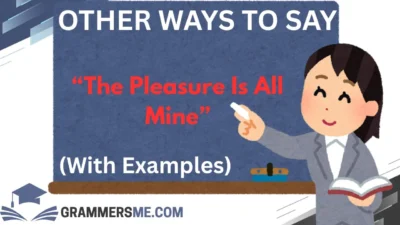When you’ve unintentionally taken someone’s time and caused inconvenience, it’s important to express genuine apology. But saying “sorry for wasting your time” over and over again can feel a bit too repetitive, and it may not always carry the level of sincerity you want to convey. The good news is there are many alternatives, each of which can help you express care, empathy, and a more personal touch.
This list will explore 30 thoughtful ways to express this sentiment, with examples to ensure your apology feels heartfelt and authentic.
What Does “Sorry for Wasting Your Time” Mean?
Before diving into the alternatives, let’s quickly break down what “sorry for wasting your time” means. At its core, this phrase acknowledges that you may have unintentionally used someone’s time in a way that wasn’t helpful or productive. It’s an apology that conveys regret for taking up someone’s precious time, which could have been better spent elsewhere. Whether it’s a delay, a mistake, or a change of plans, this phrase is commonly used in situations where time is a valuable resource.
Is It Professional/Polite to Say “Sorry for Wasting Your Time”?
Yes, it is professional and polite to express regret for wasting someone’s time, especially in business or formal settings. However, it’s important to balance this apology with clarity and a desire to make things right. A simple “sorry for wasting your time” can be sufficient, but finding more thoughtful ways to express your feelings will show that you truly care. Being respectful and clear about the situation will also help you maintain a positive relationship, even in moments of miscommunication or delay.
1. Apologies for the Inconvenience
Meaning: Acknowledging that your actions have caused someone to experience difficulty or trouble.
Explanation: This alternative is more general and focuses on the inconvenience caused, not just the time wasted.
Scenario Example: “Apologies for the inconvenience this delay has caused. I appreciate your patience as we sort this out.”
Best Use: When the issue involves more than just time and has affected the person’s convenience.
Not Use: In cases where no inconvenience was actually caused.
2. Sorry for the Delay
Meaning: Directly apologizing for a delay without explicitly mentioning time being wasted.
Explanation: This phrase conveys regret for keeping someone waiting and suggests that things didn’t go as planned.
Scenario Example: “Sorry for the delay in getting back to you. I’ve been caught up with other urgent matters, but I’ll handle it now.”
Best Use: When a response or action was delayed.
Not Use: When the situation wasn’t about waiting for something specific.
3. I Appreciate Your Patience
Meaning: Acknowledging the person’s patience in a situation that may have required them to wait or deal with uncertainty.
Explanation: This conveys appreciation for the other person’s understanding and patience in a way that feels gracious.
Scenario Example: “I appreciate your patience as we work through these issues. I know this isn’t ideal.”
Best Use: When the person has been waiting or dealing with inconvenience without complaint.
Not Use: When the other person hasn’t been particularly patient or understanding.
4. Thanks for Bearing With Me
Meaning: Thanking someone for enduring a situation or waiting through delays.
Explanation: This phrase expresses gratitude for someone’s tolerance in less-than-ideal circumstances.
Scenario Example: “Thanks for bearing with me while I sorted that out. I truly appreciate your understanding.”
Best Use: When someone has endured a long wait or difficulty because of your actions.
Not Use: When the other person has not been especially tolerant or patient.
5. I’m Grateful for Your Time and Understanding
Meaning: Expressing both gratitude for their time and their understanding of the situation.
Explanation: This variation shows appreciation and acknowledges that you value the person’s time while also recognizing their patience.
Scenario Example: “I’m grateful for your time and understanding regarding the change in plans. I’ll make sure it doesn’t happen again.”
Best Use: When you want to express both regret and thanks for someone’s understanding.
Not Use: When the other person hasn’t demonstrated understanding.
6. Sorry for the Setback
Meaning: Acknowledging that there was a delay or unexpected issue that affected the timeline.
Explanation: This alternative focuses on the setback itself, suggesting that things didn’t go according to plan.
Scenario Example: “Sorry for the setback. I didn’t anticipate the delay, but I’ll make it right moving forward.”
Best Use: When the situation involved a significant delay or disruption.
Not Use: When there wasn’t a major setback, but simply a minor inconvenience.
7. I Didn’t Mean to Hold You Up
Meaning: Acknowledging that your actions unintentionally caused the person to wait.
Explanation: This phrase expresses that you didn’t intend to waste their time and feels more personal than a standard apology.
Scenario Example: “I didn’t mean to hold you up. Thanks for waiting while I figured that out.”
Best Use: When you feel responsible for keeping someone waiting unnecessarily.
Not Use: When the person wasn’t actually held up or delayed.
8. Sorry for the Disruption
Meaning: Apologizing for causing an interruption or disturbance to someone’s time or plans.
Explanation: This alternative implies that something in the flow of things was interrupted, causing inconvenience.
Scenario Example: “Sorry for the disruption in your schedule. I should’ve communicated the delay earlier.”
Best Use: When the situation caused a noticeable disruption to someone’s routine or plans.
Not Use: When the interruption wasn’t significant or didn’t affect their schedule much.
9. My Apologies for the Confusion
Meaning: Apologizing for causing any confusion that led to wasted time or unnecessary delays.
Explanation: This phrase focuses on the misunderstanding that led to a delay.
Scenario Example: “My apologies for the confusion earlier. I should have clarified the details before we moved forward.”
Best Use: When a misunderstanding caused the wasted time or miscommunication.
Not Use: When there was no confusion involved in the situation.
10. I Regret the Inconvenience
Meaning: Expressing regret over causing inconvenience in a situation.
Explanation: This phrase emphasizes your regret for the situation but in a formal and courteous manner.
Scenario Example: “I regret the inconvenience this has caused. I’ll ensure this doesn’t happen again.”
Best Use: When a more formal tone is necessary, but you still want to acknowledge the impact on the person.
Not Use: When the inconvenience was minor or not very impactful.
11. Thanks for Your Patience Through This
Meaning: Thanking someone for waiting while things were being worked out.
Explanation: This phrase expresses both gratitude and acknowledgment of the person’s patience.
Scenario Example: “Thanks for your patience through this. I know it’s been frustrating, but I’ll make sure it’s resolved shortly.”
Best Use: When the person has waited or tolerated a delay without complaint.
Not Use: If the person hasn’t been particularly patient or understanding.
12. I Didn’t Mean to Cause You Trouble
Meaning: Acknowledging that your actions unintentionally created a problem for someone.
Explanation: This phrase feels personal and suggests that you regret causing any kind of trouble or inconvenience.
Scenario Example: “I didn’t mean to cause you trouble with that last-minute change. I’ll ensure it’s smoother next time.”
Best Use: When you genuinely feel responsible for causing trouble.
Not Use: When no significant trouble was caused.
13. I Apologize for the Oversight
Meaning: Admitting to missing something important or overlooking a detail that led to wasted time.
Explanation: This alternative focuses on taking responsibility for neglecting something important.
Scenario Example: “I apologize for the oversight regarding the meeting time. I should’ve double-checked the details before confirming.”
Best Use: When an error or oversight on your part led to the wasted time.
Not Use: When the issue wasn’t related to an oversight or mistake.
14. I Appreciate Your Flexibility
Meaning: Thanking someone for being adaptable or willing to adjust due to changes or delays.
Explanation: This phrase acknowledges that the other person was flexible with their time or expectations, which can help ease the frustration of an unexpected situation.
Scenario Example: “I appreciate your flexibility with the meeting schedule. I realize it wasn’t ideal, but I’m grateful for your understanding.”
Best Use: When the person had to make adjustments because of your actions or delays.
Not Use: When the person hasn’t shown flexibility or willingness to adjust.
15. Sorry for the Miscommunication
Meaning: Apologizing for any unclear or confusing communication that led to wasted time.
Explanation: This phrase is useful when the cause of wasted time was a failure to communicate properly.
Scenario Example: “Sorry for the miscommunication regarding the deadline. I’ll clarify everything moving forward.”
Best Use: When the delay or inconvenience was due to unclear instructions or messages.
Not Use: When there was no miscommunication involved in the situation.
16. Thanks for Understanding
Meaning: Showing gratitude for someone’s patience and ability to understand the circumstances.
Explanation: This phrase expresses appreciation for someone who has been understanding about a situation that caused inconvenience.
Scenario Example: “Thanks for understanding while I resolved the issue. Your patience really helped.”
Best Use: When the person has been understanding and hasn’t expressed frustration about the delay.
Not Use: If the person has shown dissatisfaction or frustration.
17. I’m Sorry for Any Discomfort Caused
Meaning: Apologizing for any discomfort or unease caused by the situation, rather than just time.
Explanation: This expression is more empathetic and focuses on any emotional or physical discomfort that might have been caused by the situation.
Scenario Example: “I’m sorry for any discomfort caused by the last-minute changes to the plan. I know that’s frustrating.”
Best Use: When the situation caused someone to feel uneasy or stressed, not just inconvenienced.
Not Use: If the person wasn’t visibly uncomfortable or distressed.
18. I Apologize for My Mistake
Meaning: Directly taking responsibility for an error that led to wasted time.
Explanation: This phrase is a straightforward admission of fault, emphasizing personal accountability.
Scenario Example: “I apologize for my mistake in scheduling the meeting. I should’ve checked the details earlier.”
Best Use: When you’ve made a mistake and want to take responsibility for it.
Not Use: When you don’t believe you were at fault or made no mistake.
19. Thank You for Your Time and Patience
Meaning: Expressing gratitude not just for their time, but for their patience in dealing with the situation.
Explanation: This phrase conveys deep appreciation and acknowledges that the person’s time and patience were both valuable.
Scenario Example: “Thank you for your time and patience as we worked through the issue. I’m grateful for your understanding.”
Best Use: When you want to convey appreciation for both the time spent and the person’s willingness to wait.
Not Use: When the person didn’t show patience or understanding.
20. I’m Sorry for the Trouble I Caused
Meaning: Acknowledging that you’ve caused unnecessary difficulty for someone.
Explanation: This phrase is more empathetic and suggests that you feel responsible for any extra work or hassle they had to deal with.
Scenario Example: “I’m sorry for the trouble I caused. I didn’t intend to make things harder for you.”
Best Use: When your actions have directly caused someone trouble or additional work.
Not Use: When no trouble was actually caused, and the situation wasn’t particularly troublesome.
21. Apologies for the Confusion I Created
Meaning: Apologizing for any misunderstanding or confusion you caused.
Explanation: This is a useful way to express regret for any confusion you might have created, especially if it resulted in wasted time.
Scenario Example: “Apologies for the confusion I created. I’ll make sure to communicate more clearly moving forward.”
Best Use: When your actions led to confusion, delays, or misunderstandings.
Not Use: If no confusion was involved, or the situation was straightforward.
22. Sorry for the Unexpected Change
Meaning: Apologizing for any unanticipated change that caused inconvenience.
Explanation: This phrase focuses on the unexpected nature of the change, acknowledging that it wasn’t planned and likely caused some disruption.
Scenario Example: “Sorry for the unexpected change in plans. I know it was short notice, and I appreciate you accommodating it.”
Best Use: When something was altered suddenly, and it led to confusion or time wasted.
Not Use: If the change wasn’t truly unexpected or disruptive.
23. I Hope This Didn’t Cause You Too Much Trouble
Meaning: A softer way to express regret, suggesting that you hope the situation didn’t create too many issues for the other person.
Explanation: This phrase conveys concern about the other person’s experience, while also acknowledging that the situation may not have been ideal.
Scenario Example: “I hope this didn’t cause you too much trouble. Let me know if there’s anything I can do to make it right.”
Best Use: When you’re unsure of the full extent of the inconvenience but want to express concern.
Not Use: If the trouble caused was significant and you need to be more direct.
24. Sorry for the Misunderstanding
Meaning: Apologizing for any confusion or misinterpretation of the situation.
Explanation: This phrase addresses situations where things weren’t clear and led to wasted time or frustration.
Scenario Example: “Sorry for the misunderstanding regarding the project details. I’ll clarify everything right away.”
Best Use: When something was misunderstood, causing time to be wasted.
Not Use: When no misunderstanding actually took place.
25. Thank You for Your Patience and Understanding
Meaning: Acknowledging both the person’s patience and their ability to understand the situation.
Explanation: This phrase emphasizes gratitude for both the time they spent waiting and their empathetic approach to the situation.
Scenario Example: “Thank you for your patience and understanding while I worked through the issue. Your support means a lot.”
Best Use: When the person was both patient and understanding during a difficult situation.
Not Use: When the person was neither patient nor understanding.
26. I Know This Wasn’t Ideal
Meaning: Recognizing that the situation wasn’t ideal, and apologizing for it.
Explanation: This phrase acknowledges that the circumstances were less than perfect, but you’re taking responsibility for it.
Scenario Example: “I know this wasn’t ideal, and I’m really sorry for the inconvenience. I’ll ensure this doesn’t happen again.”
Best Use: When you recognize that things didn’t go well and want to apologize for it.
Not Use: If the situation was acceptable or didn’t really fall short.
27. I’m Sorry for the Trouble I Caused You
Meaning: A more personal way of apologizing for trouble caused by your actions.
Explanation: This phrase is empathetic, taking personal responsibility for the trouble caused.
Scenario Example: “I’m sorry for the trouble I caused you earlier. I didn’t mean to make things more difficult.”
Best Use: When you are genuinely concerned about the inconvenience or trouble you’ve caused.
Not Use: When the situation didn’t result in any real trouble.
28. I Apologize for Any Frustration Caused
Meaning: Apologizing specifically for any frustration that may have resulted from the situation.
Explanation: This phrase highlights emotional impact, showing empathy for how the person may have felt.
Scenario Example: “I apologize for any frustration caused. I know this wasn’t what you expected.”
Best Use: When you know the other person may have been frustrated by the situation.
Not Use: If there was no frustration involved or if the situation was minor.
29. I Appreciate You Taking the Time
Meaning: Expressing gratitude for someone’s time, acknowledging that it was valuable.
Explanation: This alternative focuses on appreciating the time spent, especially if you feel the person has been overly patient or understanding.
Scenario Example: “I appreciate you taking the time to meet with me today. I know it wasn’t the most efficient use of your time.”
Best Use: When someone has taken time out of their day for something that didn’t pan out as expected.
Not Use: If the person didn’t actually spend much time or effort.
30. I’m Sorry for Any Inconvenience I May Have Caused
Meaning: A formal way to apologize for any inconvenience you might have unintentionally caused.
Explanation: This phrase is polite and considerate, leaving room for both minor and major inconveniences.
Scenario Example: “I’m sorry for any inconvenience I may have caused. I’ll ensure this doesn’t happen again.”
Best Use: When you want to be polite and professional, acknowledging potential inconvenience.
Not Use: If there was no real inconvenience or problem caused.
Conclusion
Apologizing for wasting someone’s time is all about showing empathy and understanding. It’s not just about the words you use but the tone and sincerity behind them. Each alternative in this list provides a way to express regret and appreciation in a way that suits the context, whether it’s a professional setting or a personal interaction.
The key is to acknowledge the inconvenience, apologize, and show gratitude for the person’s patience and understanding. By doing so, you’ll maintain strong relationships and handle these situations with care and thoughtfulness.
FAQs
1. Why do apologies for wasting time matter?
Apologies for wasting time show that you respect the other person’s time and value their presence. It’s an acknowledgment that their time is important and that you care about how they feel.
2. Can I say “sorry for wasting your time” in a professional setting?
Yes, but it’s always best to vary the way you apologize in professional settings. Use alternatives that are polite, sincere, and appropriate for the situation.
3. When is the best time to apologize for wasting someone’s time?
Apologize as soon as you realize you’ve caused a delay or inconvenience. Timeliness shows that you’re considerate and aware of the impact of your actions.
4. How do I make my apology sound sincere?
Be specific about what caused the issue and express genuine regret. Avoid using overly casual language, and be sure to thank the person for their patience or understanding.
5. Can I apologize for wasting someone’s time even if it wasn’t intentional?
Yes, acknowledging that even if it wasn’t your intention, you realize their time was affected, shows thoughtfulness and empathy.




